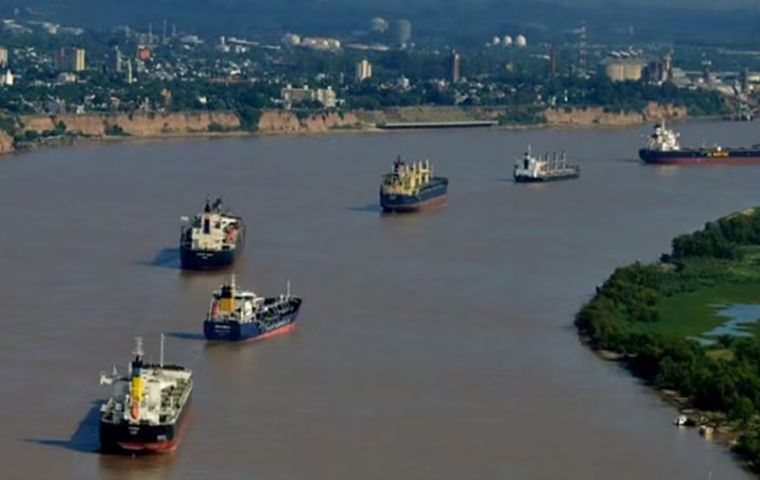MercoPress. South Atlantic News Agency
Waterway users support ongoing bidding process
 A key meeting is scheduled for July 23 in Paraná
A key meeting is scheduled for July 23 in Paraná Major business users of the Paraná-Paraguay Waterway (agro-exporters, industrialists, and port operators) have issued a joint statement supporting the Argentine government's bidding process for a private operator of the Trunk Waterway. They urge all stakeholders to channel their proposals, including those related to tariffs and environmental impact, through the established technical dialogue tables to avoid hindering consensus.
“It is essential that discussions and proposals take place within these institutional and technical forums, with the rigor that a project of this magnitude demands,” the statement read.
These business groups, including the Argentine Industrial Union (UIA), the Oil Industry Chamber, the Grain Exporters Center, the Chamber of Private Commercial Ports, the Chamber of Port and Maritime Activities, and the Rosario Stock Exchange, view the ongoing process as crucial for the future of the country's main logistics system.
“This process is supported by a series of technical roundtables that allow the different actors in the system—provinces, users, experts, and institutions, among others—to present their contributions, proposals, and observations,” they said.
They emphasize their active participation in the third technical roundtable on July 23 in Paraná, which will focus on the environmental impact of increased dredging and the tariff structure. The presence of the United Nations Conference on Trade and Development (UNCTAD) as a supervisory body is seen as a guarantee for international standards.
Key discussions at the July 23 meeting will revolve around the environmental impact of dredging, including how and when to carry it out, who should be responsible, and the management of removed sediment. Productive sectors are pushing for deeper dredging to allow for more loaded ships. The other critical issue is the tariff discussion, specifically the composition of the toll and whether the current sectional pricing (more like a flat rate) will be maintained or shifted to a distance-based system.
This latter point is a source of contention between the ports of Greater Rosario, which benefit from the current scheme, and the ports closer to the start of the system (Buenos Aires and La Plata), which advocate for distance-based pricing to attract direct container shipping.
While there is a recognized need to lower logistics costs and ensure a competitive toll, the diverse interests of the ports present a complex negotiation. The government is expected to publish the tender documents in October, likely after the national elections, suggesting that the final terms may be influenced by the administration's post-election political strength.
The third technical roundtable on July 23 in the city of Paraná “is a key space for channeling the concerns of all sectors interested in a more efficient, modern, and sustainable waterway, particularly regarding economic, control, and environmental aspects,” they argued.
“It is essential that discussions and proposals take place within these institutional and technical frameworks, with the rigor that a project of this magnitude demands. Debates that take place outside these channels not only undermine common objectives, but also hinder the possibility of reaching consensus, such as that already achieved during the roundtable held at the Rosario Stock Exchange in May,” they insisted.
”On the other hand, the participation of the United Nations Conference on Trade and Development (UNCTAD) as a supervisory body provides additional guarantees for the application of international standards at each stage of the procedure. We are convinced that this new process will allow us to arrive at a well-designed and executed tender, where technical and economic conditions will be assessed in a balanced manner, thereby significantly improving Argentina's foreign trade logistics system and making the entire country's economy more competitive,“ they went on.
”The development of a more efficient and predictable waterway is an essential condition for sustaining and enhancing the export capacity of Argentina and the entire region that flows into the La Plata river system,” they elaborated.




Top Comments
Disclaimer & comment rulesCommenting for this story is now closed.
If you have a Facebook account, become a fan and comment on our Facebook Page!